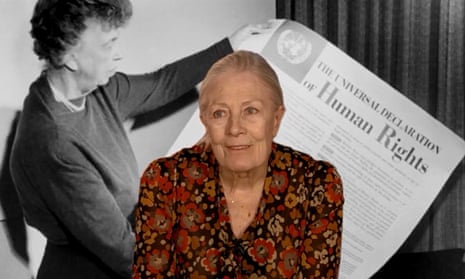Vanessa Redgrave’s personal documentary-essay on the refugee crisis has sincerity and force, and some valuable insights; I think it deserves a hearing, despite the obvious ungainliness of its production values. Sea Sorrow sometimes resembles a campaign video, with Redgrave herself sometimes lecturing the audience in greenscreen, holding up a poster designed by her granddaughter, with a clunky shot of refugee children simply placed behind her.
There is also another sequence when a Sky TV News report is simply used in its unedited entirety, evidently on the basis that Redgrave is herself interviewed in it. These are errors of judgement and discrimination which reveal Redgrave’s directorial inexperience. Yet her film often succeeds as rhetoric and she is on strong ground when relating the issue to her own personal experience and to her meditations on Shakespeare and the theatre, however exasperating some may find this.
The title is at first glance an echo of Gianfranco Rosi’s magnificent refugee documentary study Fire at Sea: a film whose subtlety, complexity and depth I have to say go way beyond this. Actually, it is a quotation from Shakespeare’s The Tempest, when Prospero tells Miranda the history of their “sea sorrow”, and how they came to be exiles on a remote island, far from Milan, the former seat of his power and prosperity. Redgrave stages a brief, powerful dramatised reading of the scene, with Prospero played by Ralph Fiennes. They are refugees, in their way, Redgrave is implying: people like us, white Europeans to whom we are naturally invited to extend sympathy and esteem. (Another contemporary reading of The Tempest might be to imagine Caliban, the island’s indigenous inhabitant, harassed and demonised as a monster, getting into an inflatable and finally turning up in Milan as a refugee, demanding succour.)
Redgrave also quotes the lines from Sir Thomas More, attributed to Shakespeare, asking those who deride refugees to put themselves in their place: “...whither would you go?/What country, by the nature of your error,/Should give you harbour...?” It is a powerful point, and those lines bear repeating.
But the meat of Redgrave’s film is the plight of refugee children in the chaotic Calais camps and Lord Dubs’s effort in the House of Lords to compel the last government to increase the numbers of children allowed in – Dubs’s passion for the subject being partly caused by the fact that he himself was on the Kindertransport as a child. Redgrave talks about the experiences of the second world war, when Britain did accept children (though not parents) in this way, and people in the country accepted evacuees, internally displaced refugees, who would otherwise face mortal danger in the blitz. Later, Europe had to absorb hundreds of thousands of refugees after the Hungarian uprising in 1956. Redgrave is arguing that the issue of refugees in Europe is hardly new.
As for the Calais camps, Dubs is furious at the heavy-handed way they were demolished and their inhabitants moved on, a display of police power he attributes to the local need to appease the Le Pen National Front. He adds that fascism should rather be stood up to – although neither he nor Redgrave meditate on the fact that neither David Cameron nor Barack Obama wished to take military action against Assad that some believed was precisely this: a matter of standing up to fascism.
Yet Dubs is a compelling and dignified witness and Redgrave’s film uses his testimony and expertise simply and well. The same goes for the insightful commentary offered by dramatist Martin Sherman who very persuasively argues that the refugee camps are occupied by people in a communal state of shock: pure adrenaline and courage have carried them on their unimaginably horrible journey, in which they have had to suppress their normal human reaction to the deaths of family members on the road. Now marooned at their journey’s end in Calais, they are suffering a new unfolding trauma. He is asking for compassion on these grounds, too.
In terms of the art and craft of film-making, Sea Sorrow doesn’t score heavily. But Redgrave is entitled to point to the overwhelming relevance of the subject matter that she, as a film-maker, has chosen: a subject that other more smoothly accomplished directors might shy away from.






Comments (…)
Sign in or create your Guardian account to join the discussion